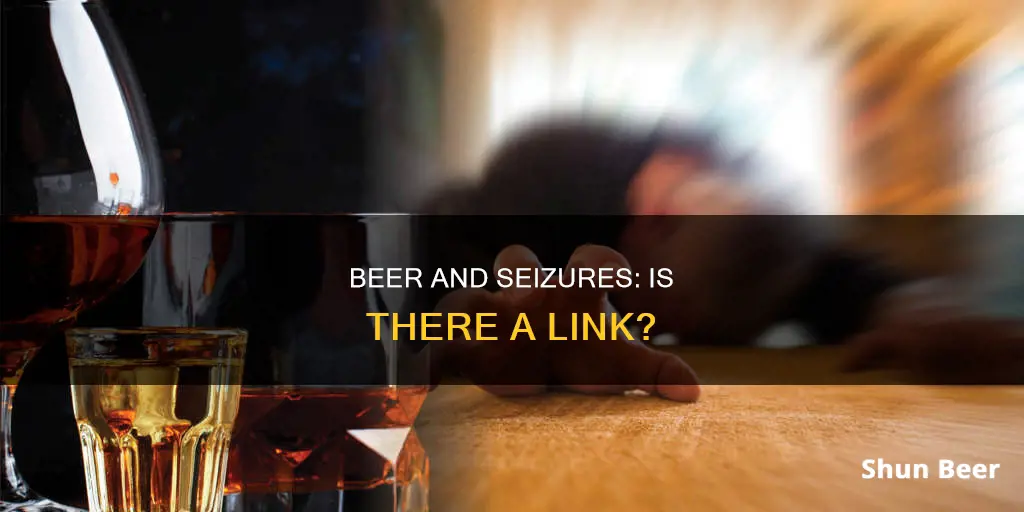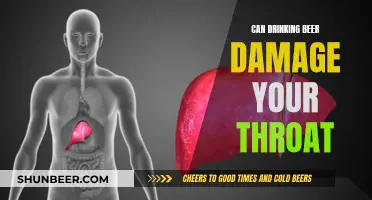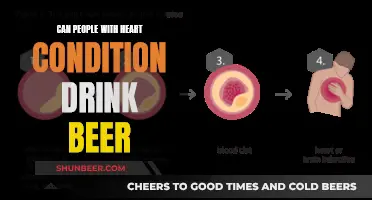
Alcohol can cause seizures, but the link is complex. Drinking small amounts of alcohol generally does not trigger seizures, but seizures can result from alcohol withdrawal, especially in those who are dependent on alcohol or drink heavily. Binge drinking can also increase the risk of seizures, especially during withdrawal. Alcohol affects the brain in many ways, acting on receptors called gamma-aminobutyric acid (GABA) receptors, which are closely linked to seizure risk. This creates a close connection between alcohol use and seizures. For people with epilepsy, drinking alcohol can have serious consequences, and it is recommended that they avoid it completely if possible. However, drinking a small amount, such as one or two beers, does not increase seizure activity.
| Characteristics | Values |
|---|---|
| Can drinking beer cause seizures? | Drinking beer in small amounts does not generally trigger seizures. |
| Alcohol-induced seizures | Alcohol can cause seizures, but they are more likely to occur during alcohol withdrawal. |
| Alcohol withdrawal seizures | Alcohol withdrawal can trigger a seizure, especially in heavy drinkers. |
| Alcohol and epilepsy | Alcohol consumption is a common trigger for seizures in those with epilepsy. |
| Alcohol-related seizures in people without epilepsy | Chronic alcohol consumption can cause seizures in people without a history of seizures. |
| Alcohol poisoning and seizures | Alcohol poisoning can increase the risk of seizures by causing hypoglycemia and hypoxia. |
| Preventing alcohol-induced seizures | Binge drinking and alcohol withdrawal can be prevented by moderating alcohol intake and avoiding alcohol dependence. |
What You'll Learn

Alcohol withdrawal seizures
The risk of experiencing alcohol withdrawal seizures is higher for those who have abused alcohol for a long time and in large quantities. Other risk factors include previous withdrawal attempts, concurrent medical conditions, use of other drugs, and age. Older adults may be more vulnerable to alcohol withdrawal seizures due to age-related physiological changes.
It is important to note that binge drinking can also lead to alcohol withdrawal seizures, even in people without epilepsy. Binge drinking is defined as drinking a lot of alcohol in a short period.
If someone is experiencing a seizure due to alcohol withdrawal, it is important to move objects out of the way to prevent injury, call 911, and position them on their side to ensure their airway is clear while waiting for emergency assistance.
To prevent alcohol withdrawal seizures, it is crucial to avoid binge drinking and moderate alcohol consumption to prevent the development of alcohol dependence. Supervised medical detox is recommended for those at risk of severe withdrawal symptoms, including seizures.
Beer Drinking Without Weight Gain: Is It Possible?
You may want to see also

Alcohol poisoning
The symptoms of alcohol poisoning include mental confusion, difficulty staying conscious, vomiting, seizures, slow or irregular breathing, dulled responses (such as no gag reflex), and extremely low body temperature. If someone is displaying these symptoms, it is important to call for emergency medical help immediately. Do not try to make the person vomit, and do not put them in a cold shower or bath as this can be dangerous. Instead, keep them warm and sitting up if they are awake, or put them in the recovery position if they are unconscious. Make sure they are breathing properly and give them water to sip if they can swallow.
In addition to increasing the risk of seizures, alcohol poisoning can also lead to slow or absent breathing, resulting in hypoxia. This condition, characterised by a lack of oxygen in the brain, can further increase the likelihood of seizures and cause temporary or permanent brain damage.
Muslims and Non-Alcoholic Beer: Is It Permissible?
You may want to see also

Alcohol-related epilepsy
For those with epilepsy, the interaction between alcohol and anti-seizure medications is an important consideration. Alcohol can enhance the effects of these medications, leading to increased intoxication and potential side effects. Additionally, the combination of alcohol and seizure medications can result in bothersome and potentially dangerous consequences, such as impaired awareness, reflexes, and coordination. Therefore, it is generally recommended that individuals with epilepsy avoid moderate to heavy alcohol use and consult their doctor before consuming any alcohol.
Research has found a link between chronic alcohol abuse and the development of epilepsy. Alcohol withdrawal seizures may make the brain more excitable, leading to unprovoked epilepsy seizures even in the absence of alcohol use. This is supported by studies showing that individuals with a history of alcohol withdrawal seizures are more likely to experience seizures during withdrawal and have a higher risk of seizures in general.
To prevent alcohol-related seizures, it is crucial to avoid binge drinking and maintain moderate alcohol consumption to prevent alcohol dependence. Detoxification from alcohol should be done under medical supervision to manage the risks effectively.
Unlimited Beer Ads: Legal and Ethical Considerations
You may want to see also

Alcohol's effect on anti-seizure medication
Alcohol and anti-seizure medication are not a good mix. Mixing the two can have serious consequences. Alcohol can make some seizure medications less effective, and it can also make your body process certain anti-seizure medications faster, which could lead to a breakthrough seizure.
Drinking alcohol with anti-seizure medication can also intensify the effects of both. Many seizure drugs have a sedative effect, and so does alcohol. This means that a couple of alcoholic drinks consumed alongside your seizure meds could make you feel 'drunk' much faster than usual.
Some anti-seizure drugs should never be mixed with alcohol. For example, certain epilepsy medications, including clonazepam (Klonopin), lorazepam, and diazepam (Valium), contain benzodiazepine. When this drug interacts with alcohol, it can be very dangerous, affecting your heart rate and breathing.
If you are taking anti-seizure medication, it is important to consult your doctor or pharmacist about whether it is safe to drink alcohol.
Understanding Beer Pumps: The Inner Workings Explained
You may want to see also

Alcohol-related seizures in people without epilepsy
Alcohol can cause seizures in people without epilepsy, but this is usually the result of alcohol withdrawal rather than drinking itself.
Binge drinking and alcohol withdrawal can lead to seizures, even in people without epilepsy. This is because alcohol withdrawal can cause a rebound effect in the brain, increasing the likelihood of a seizure. The risk of seizures is higher for those who have a history of heavy drinking over a long period of time.
Chronic alcohol abuse can also increase a person's risk of developing epilepsy. Research suggests that repeated alcohol withdrawal seizures may make the brain more susceptible to seizures, even in the absence of alcohol.
Additionally, alcohol can lower a person's blood sugar levels, leading to hypoglycaemia, which is a known cause of seizures.
It is important to note that drinking in moderation does not typically trigger seizures, and most people who drink lightly or moderately are at low risk of alcohol withdrawal seizures.
Beer Shampoo: Safe to Drink?
You may want to see also
Frequently asked questions
Drinking beer or any other alcoholic drink does not normally cause seizures. However, seizures can result from alcohol withdrawal when you’re dependent on alcohol or drink heavily.
It is recommended that those with epilepsy avoid alcohol completely if possible. However, some people with epilepsy can have up to two drinks per day. A standard drink is defined as one glass of wine, one beer, or one shot of spirits.
Alcohol may affect anti-seizure medications, which could trigger seizures. Alcohol negatively affects sleep, and sleep disruptions may trigger seizures. Alcohol also increases the risk of epilepsy.







